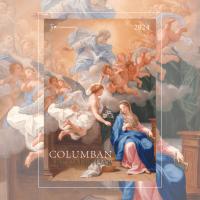
John Stephen Dwyer, Melkite-Christ-the-King, CC BY-SA 3.0
We come to the end of the Church’s liturgical year and what a mighty conclusion it is in St Matthew’s gospel! All nations will be gathered when the Son of Man comes in his glory and sits on his throne as judge and reckoner.
The gospel proclaims that people are judged by the deeds they perform. Many people have a deep sense of fairness and this is the time when fairness is vindicated, when evil is overcome, when all things come together under God.
The gospel is Good News.
Since humans are social beings, the good that people have done to each other and the evil or neglect that they have done – they will be held accountable.
The king, Jesus Christ has power and dominion, but he is also a shepherd, identified as the Good Shepherd who looked after his people as a shepherd cared for his sheep.
The assembled multitude will be separated into two groups, only two groups, and they are like ‘sheep’ and’ goats’ in the gospel.
One piece of information which assists us here is that sheep suffered in silence, hence Jesus was described as the ’suffering servant’; rams protected the ewes from other rams not of their flock; sheep were symbols of honour in that culture. But goats had no loyalty to their flock; they allowed other male goats access to their females, goats were considered shameful animals and a symbol of shame.
Jesus, the judge and shepherd divides everyone into two groups. The ‘sheep’ people are welcomed and the ‘goat’ people are shunned.
Jesus gives his criteria for his choice. He identifies himself with the poor and suffering, the strangers. These are the ones lifted up and helped by good, generous people; it is as if they have done this to God.
The good people are puzzled by this, as if they did not realise the power for good of their actions, yet their religion indicated the reward they would receive. Similarly, his criteria for rejecting the others is that they never assisted those in need. Therefore, he would have no part of them. They are indignant that he judged them in this way – they did not know he identified with those in need. The gospel is crystal clear that actions are key.
The honour/shame culture in Jesus’ day enables us to understand the depth of this great event. Their culture was such that looking after the extended family was a given, to be expected, unquestioned. But the culture also demanded that hospitality must extend to strangers.
The people who are condemned by the just judge are somewhat disingenuous when they are confounded by their sentence. Their decision to ignore the needy is their downfall. They became used to living in a dishonourable way and did not ‘see’ those in need. The gospel describing Lazarus the beggar sitting at the door of the rich man is one illustration. No one has to love God or his people but the gospel reminds us there are consequences.
Columban Fr Gary Walker is currently living at the Columban house in Sandgate, Brisbane.


